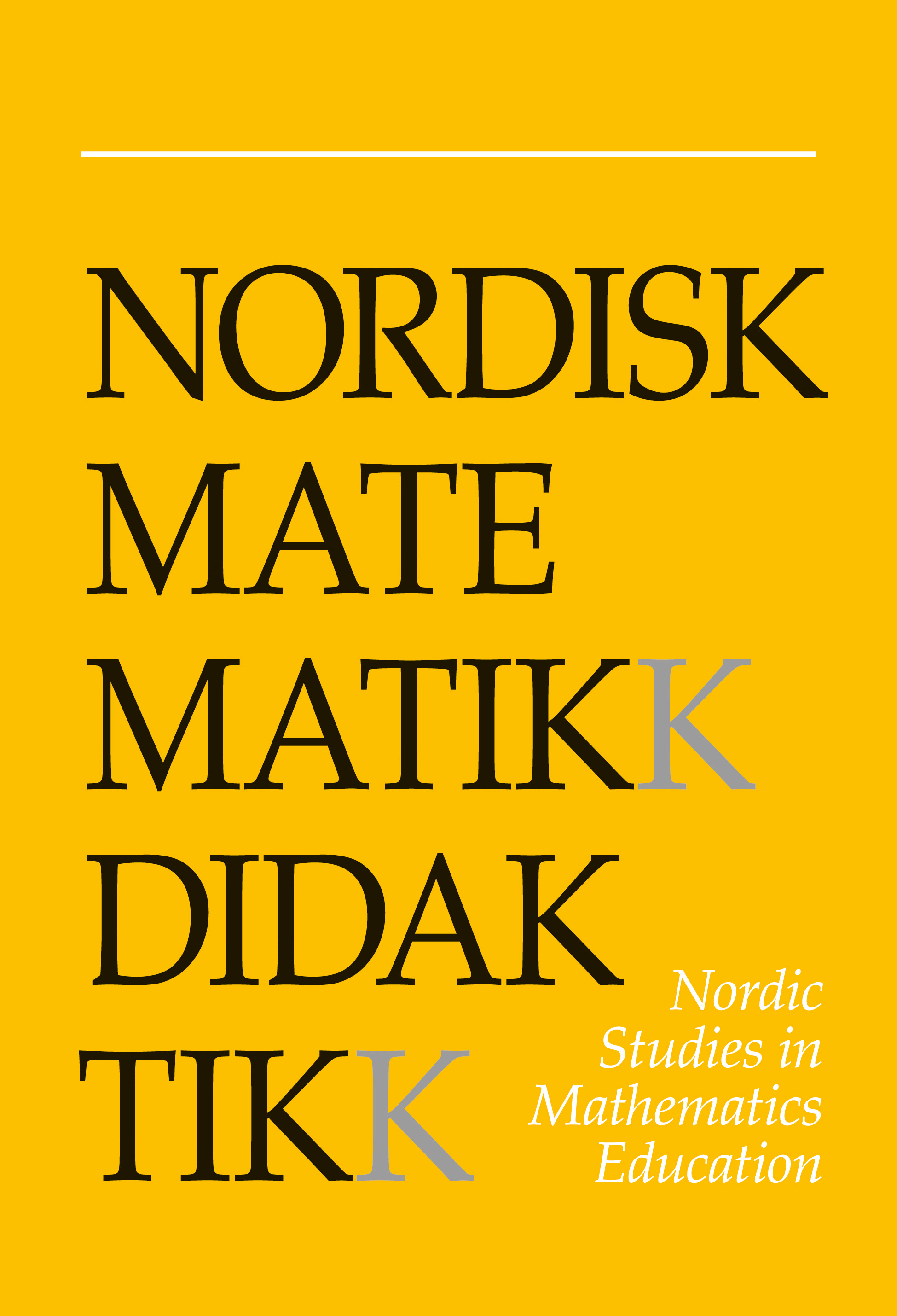An anthropological approach to a transitional issue – analysis of the autonomy required from mathematics students in the French lycee
DOI:
https://doi.org/10.7146/nomad.v14i2.148174Abstract
This paper intends to contribute to the process of theoretical networking within the mathematics education research community. Some key elements of the Anthropological Theory of Didactics are recalled and used to deal with the issue of French students’ transitional difficulties in mathematics between Collège (lower secondary school) and Lycée (upper secondary school). The intention is showing how this theoretical framework, in contrast with a theoretical framework of Advanced Mathematical Thinking, provides tools to analyse the changes between these two institutions and thus supports the following assumption: An increasing autonomy as problem solvers as well as mathematics learners is required from the upper secondary school students. This hypothesis led to a clinical investigation on high school students’ homework. This paper addresses the hypothesis by drawing on the case of three high-achieving students.
References
Barbé, J., Bosch, M., Espinoza, L. & Gascón, J. (2005). Didactics restrictions on the teacher's practice: the case of limits of functions in Spanish high schools. Educational Studies in Mathematics, 59 (1 -3), 235-268. https://doi.org/10.1007/s10649-005-5889-z
Bosch, M., Fonseca, C. & Gascón, J. (2004). Incompletitud de las organizaciones matemáticas locales en las instituciones escolares.Recherches en Didactique des Mathématiques, 24 (2-3), 205-250.
Carlson, M.P. & Bloom, I. (2005). The cyclic nature of problem solving: an emergent multidimensional problem-solving framework. Educational Studies in Mathematics, 58, 45-75. https://doi.org/10.1007/s10649-005-0808-x
Castela, C. (2000). Un objet de savoir spécifique en jeu dans la résolution de problèmes: le fonctionnement mathématique. Recherches en Didactique des Mathématiques, 20 (3), 331-380.
Castela, C. (2004). Institutions influencing mathematics students private work: a factor of academic achievement. Educational Studies in Mathematics, 57 (1), 33-63. https://doi.org/10.1023/B:EDUC.0000047050.70008.59
Castela, C. (2008). Travailler avec, travailler sur la notion de praxéologie mathématique pour décrire les besoins d'apprentissage ignorés par les institutions d'enseignement. Recherches en Didactique des Mathématiques, 28 (2), 135-182.
Chevallard, Y. (1992). Concepts fondamentaux de la didactique: perspectives apportées par une approche anthropologique. Recherches en Didactique des Mathématiques, 12 (1), 73-112.
Chevallard, Y. (1999). L'analyse des pratiques enseignantes en théorie anthropologique du didactique. Recherches en Didactique des Mathématiques, 19 (2), 221-266.
Chevallard, Y. (2006). Steps towards a new epistemology in mathematics education. In Bosch, M. (Eds.), Proceedings of the 4th Conference of the European society for Research in Mathematics Education (pp. 21-30). Retrieved June 15, 2009 from http://ermeweb.free.fr/CERME4/CERME4_2_Plenaries.pdf
Cuoco, A., Goldenberg, E. & Mark, J.(1997). Habits of mind: an organizing principle for mathematics curriculum. Journal of Mathematical Behavior, 15 (4), 375-402 https://doi.org/10.1016/S0732-3123(96)90023-1
Dorier, J-L., Robert, A., Robinet, J. and Rogalski, M. (1997). A propos du levier «méta». In J.-L. Dorier (Ed.), L'enseignement de l'algèbre linéaire en question. Grenoble: La Pensée Sauvage.
Félix, C. & Joshua, J. (2002). Le travail des élèves à la maison: une analyse didactique en termes de milieu pour l'étude. Revue Française de Pédagogie, 141, 89-97. https://doi.org/10.3406/rfp.2002.3074
Grugeon, B. (1995). Etude des rapports institutionnels et des rapports personnels des élèves dans la transition entre deux cycles d'enseignement (doctoral thesis). Université Paris 7.
Harel, G. & Sowder, L. (2005). Advanced mathematical-thinking at any age: its nature and its development. Mathematical Thinking and Learning, 7 (1), 27-50. https://doi.org/10.1207/s15327833mtl0701_3
Iannone, P. & Nardi, E. (2007). The interplay between syntactic and semantic knowledge in proof production: mathematician perspectives. In D. Pitta- Pantazi & G. Philippou (Eds.), Proceedings of the 5th Conference of the European society for Research in Mathematics Education (pp. 2300-2309). Retrieved June 15, 2009 from http://ermeweb.free.fr/CERME5b/WG14.pdf
Lester, F. K. (1994). Musing about mathematical problem solving research: 1970-1994. Journal for Research in Mathematics Education, 25, 660-675. https://doi.org/10.2307/749578
Martignone, F. (2007). Mathematical background and problem solving: how does knowledge influence mental dynamics in game theory problems? In D. Pitta- Pantazi & G. Philippou (Eds.), Proceedings of the 5th Conference of the European society for Research in Mathematics Education (pp. 2340-2348). Retrieved June 15, 2009 from http://ermeweb.free.fr/CERME5b/WG14.pdf
Praslon, F. (2000). Continuités et ruptures dans la transition terminale S/DEUG Sciences en analyse. Le cas de la notion de dérivée et son environnement (doctoral thesis). Université Paris 7.
Rasmussen, C, Zandieh, M., King, K. & Zeppo, A.(2005). Advancing mathematical activity: a practice-oriented view of advanced mathematical thinking. Mathematical Thinking and Learning, 7 (1), 51-73. https://doi.org/10.1207/s15327833mtl0701_4
Robert, A. & Rogalski, M.(2002). Comment peuvent varier les activités mathématiques des élèves sur des exercices - le double travail de l'enseignant sur les énoncés et sur la gestion en classe. Petit x, 60, 6-25.
Robert, A. & Rogalski, J. (2005). A cross-analysis of the mathematics teacher's activity. An example in a French 10th-grade class. Educational Studies in Mathematics, 59 (1-3), 269-298 . https://doi.org/10.1007/s10649-005-5890-6
Schoenfeld, A. (1983). The wild, wild, wild, wild, wild world of problem solving: a review of sorts. For the learning of mathematics, 3, 40-47.
Schoenfeld, A. (1985). Mathematical problem solving. Orlando: Academic Press.
Weber, K. & Alcock, L. (2004). Semantic and syntactic proof productions. Educational Studies in Mathematics, 56, 209-234 https://doi.org/10.1023/B:EDUC.0000040410.57253.a1
Winslow, C. (2007). Les problèmes de transition dans l'enseignement de l'analyse et la complémentarité des approches diverses de la didactique. Annales de didactiques et de Sciences cognitives, 12, 189-204.
Zazkis, R. & Applebaum, M. (2007). Advancing mathematical thinking: looking back on one problem. In D. Pitta- Pantazi & G. Philippou (Eds.), Proceedings of the 5th Conference of the European society for Research in Mathematics Education (pp. 2389-2397). Retrieved June 15, 2009 from http://ermeweb.free.fr/CERME5b/WG14.pdf
Downloads
Published
How to Cite
Issue
Section
License

This work is licensed under a Creative Commons Attribution-NonCommercial-ShareAlike 4.0 International License.



